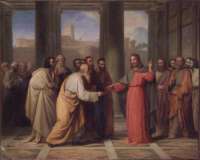
EASTER - ITS JEWISH AND
CHRISTIAN ORIGINS
JEWISH EASTER
The word Easter is derived from the Jewish term Pesach which means Passover.
It was the yearly festival commemorating the miraculous Red Sea crossing
when Moses set free the Jews from Egyptian slavery lasted 430 years.
Today Jews still celebrate this festival.
Moses led Israel through the desert towards the Palestine, The Promised Hand,
for 40 years and with many difficulties caused by the frequent rebellious acts
of the owners of the grounds crossed by the big Jewish caravan.
For that reason Moses chose the hard way of the desert.
In order to commemorate this historical voyage through the desert,
the Easter feast was celebrated in each Jewish family
by eating foods and drinking beverages
with a strong symbolic meaning.
Members of the family were standing with a stick,
eating a roasted leg of lamb and unleavened bread (because Jews left Egypt in haste
and so they didnt have enough time to let the bread rise).
The vegetables were three kind of bitter species: celery, lettuce and endive
in order to commemorate the suffering that Jews endured in Egypt.
They also drank vinegar, salty water or lemon juice
and ate the haroseth that is a fruit mixture commemorating the mortar
that the Israelite slaves had to make by themselves for the brickworks.
Finally they ate a boiled egg as a symbol of the eternal life
due to fact that its particular surface is
without beginning and end.
CHRISTIAN EASTER
Easter is a festival celebrated by Christians
to commemorate the Resurrection of the Lord, Jesus Christ,
on the third day after his crucifixion at Calvary
as described in the New Testament.
Easter Sunday is a moveable feast,
meaning its not fixed in relation to the civil calendar.
The first Council of Nicaea (A.D. 325) established the date of Easter as the first Sunday
after the full moon following the March equinox (March 21)
and it falls between March 22 and April 25 inclusive.
Easter is preceded by Lent, a forty day period of prayer, fasting and penance
which starts on Ash Wednesday and ends on Holy Thursday, the day
on which Jesus celebrated the Last Supper with his apostles.
The last week of Lent is called Holy Week
which begins with Palm Sunday and includes Holy Thursday and Holy Friday,
commemorating the day on which Jesus Christ was crucified on the cross for the sins of the world.
Easter Sunday commemorates the Resurrection of Jesus Christ from death,
event of salvation for the whole human race.
By celebrating the Last Supper with his apostles in the course of the Passover meal,
Jesus gave the Jewish Passover its definitive meaning.
Jesus passing over to his Father by death and Resurrection, the new Passover,
is anticipated in the Supper and celebrated in the Eucharist,
which fulfills the Jewish Passover and anticipate the final Passover of the Church
in the glory of the kingdom (Catechism of the Catholic Church The Sacrament of the Eucharist:1340).
Its interesting to observe that in the Christian Easter meal
there are some foods of the Jewish Passover,
but with a different and new meaning.
the lamb represents Jesus Christ sacrified on the cross
for the redemption of human sins on the behalf of all humanity;
the egg is the symbol of the Resurrection: Christ rose from the grave on Easter Sunday morning;
as a chick breaks the shell when it is hatched and begins life,
so Our Lord comes forth living from the tomb.
SARA GIUDIZI























